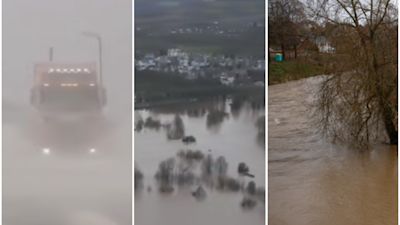Storm Christoph: Wales reels from third major flooding event in 11 months

Torrential rainfall brought by Storm Christoph has caused devastation across Wales with homes being evacuated and people having to be rescued in places.
Several flood alerts and flood warnings were issued on Wednesday and continued into Thursday with emergency services and local authorities mobilising teams to help people in distress.
The flooding has also caused landslips, bridge collapses, road closures and disrupted transport services in parts of the country.
It is the third major national flooding event to hit Wales in the space of just eleven months, with Storm Ciara and Storm Dennis causing widespread devastation last February; Wales' wettest February on record.
Here we revisit those major incidents, the impact they had on local communities and the political and environmental fallout from them.
Storm Ciara
Storm Ciara was the first to strike, hitting Wales on February 8 on the back of what had already been a very wet winter.
Ciara brought gusts of up to 80mph in coastal areas, heavy rainfall and flooding. In one part of Wales wind speeds reached 93mph, the highest in the UK at the time.
The storm mainly affected communities in Llanrwst, Llanfair Talhaiarn, St Asaph and impacted many others.
It left a devastating aftermath with the clean-up operation taking months.
Thousands of homes and businesses had been badly damaged despite local communities scrambling to do everything they could to minimise the worst effects of the flooding.
The town of Llanrwst suffered in particular, with one resident describing the sheer speed of the flooding as "like a dam bursting".
The widespread devastation galvanised the local community with people joining forces to clear away the worst of the debris and surface water that had invaded homes and other properties.
However, that sense of unity gave way to anger at local councils and the Welsh Government.
In Llanrwst, there was anger at the council over a culvert that had been allowed to overflow from the surrounding hills.
At the time, Conwy Council said it had checked the culvert before the storm and removed a build-up of debris, but the sheer amount of rainfall meant it was difficult to stop.
Storm Dennis
Wales barely had time to take stock of Storm Ciara and its aftermath before Storm Dennis struck a week later.
Dennis hit on February 15 and, much like Ciara before it, brought almost biblical-like levels of rainfall.
Natural Resources Wales described Dennis as "one of the most devastating storms to hit Wales in recent memory".
Storm Dennis was particularly felt in South Wales, hitting communities in Rhonda Cynon Taff, the South Wales Valleys and along the Usk and Wye Valleys.
Storm Dennis broke a number of records.
During its peak, 61 Flood Alerts, 89 Flood Warnings and two Severe Flood Warnings were in force; the most warnings for rivers in Wales at one time.
The water levels in several rivers across the country also reached record levels, while the River Taff at Pontypridd reached its highest level for over 40 years.
At the peak of the flood in Pontypridd, Natural Resources Wales estimated that 900 tonnes of water per second was flowing down the River Taff; that would fill an Olympic sized swimming pool in three seconds.
Analysis by Weather Presenter Ruth Dodsworth
In my near 20 years as a weather forecaster this past year or so has been one of the most varied.
From Storm Dennis this time last year, to Christoph just this week. A month's worth of rain in just a few days, as we've just witnessed with Storm Christoph across much of Wales, can cause damage beyond our imagination.
The meteorologist/journalist in me gets to tell the facts; the jaw dropping statistics, the rainfall totals, the temperature extremes, the gustiest wind speeds. But the human in me - gets to feel the impacts.
The sheer powerlessness you must feel as everything you have worked for in many cases literally gets washed away.
There are few who would now argue that Climate Change is a myth. We've just had the warmest decade on record; year by year global temperatures are rising. And as a result, our winters look set to become warmer and wetter
Named storms will become more frequent, and the scenes of carnage that headline our news programmes will inevitably become all the more familiar.
The Political Fallout
The aftermath of storms Ciara and Dennis has been as political as much as it's been environmental and economic.
In December Plaid Cymru called for an independent inquiry into the flooding in the South Wales Valleys.
There was also a debate held in the Senedd after almost 6,000 people signed a petition calling for an inquiry.
In October, Natural Resources Wales published a review into its own handling of the major flooding incidents.
It found there were issues with staffing and flood equipment.
The report also found that, in some areas, no flood warnings were given at all.
Last October, the Welsh Government set out its strategy for improving the preparations for flooding and managing major incidents.
It also said that lessons had been learned from the February floods and those lessons would inform future policy and flood defence investment.
The government also said that, between 2016 and 2021, it has invested £390million into helping manage flood risk, reducing dangers to more than 45,000 properties across Wales.
Read more: